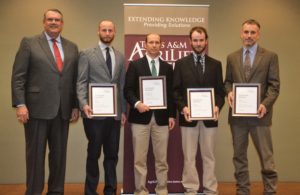Cotton technology education effort earns AgriLife Extension Superior Service award
Writer: Kay Ledbetter, 806-677-5608, [email protected]
Contact: Dr. Gaylon Morgan, 979-845-2425, [email protected]
COLLEGE STATION – The Texas A&M AgriLife Extension Service has recognized a cotton and weed team with a Superior Service Team Award for their efforts on educating producers on auxin-tolerant cotton weed control systems.

The annual Superior Service awards, presented Jan. 9 in Bryan, recognize AgriLife Extension personnel who provide outstanding performance in education or other service to the organization and Texans.
The AgriLife Extension team members recognized were Dr. Seth Byrd, cotton specialist, Lubbock; Dr. Josh McGinty, agronomist, Corpus Christi; Dr. Gaylon Morgan, state cotton specialist, College Station; Dr. Peter Dotray, weed scientist, Lubbock; and Dr. Mark Matocha, environmental safety specialist, College Station.
In response to the expected release of new cotton herbicide technologies, AgriLife Extension cotton and weed science personnel worked with state and federal agencies to encourage a balanced approach based on scientific data for the introduction of the new formulations and associated application restrictions, according to the nomination.
The team worked with the local and state commodity organizations, allied industry professionals, Texas Department of Agriculture, Texas A&M AgriLife Research and Texas Plant Protection Association to develop, implement and promote good stewardship of these new herbicides, including the Flag-the-Technology approach to decrease the potential for misapplications of herbicides to susceptible crops.
“The potential damage to neighboring crops could have been in the millions of dollars and resulted in many other legal ramifications, as noted in other states,” the nomination stated. “However, to date, the benefits of the cotton producers having a tool for managing problematic weeds far outweigh any detrimental impacts from these technologies, and have increased economic returns to growers in 2017, and into the near future.”
“As a cotton producer organization serving 41 counties where growers usually produce about two-thirds of the state’s cotton crop, we appreciate this team for directly meeting the needs of our growers,” said Steve Verett, Cotton Inc. executive vice president in Lubbock, in a letter of support.
“They have done a magnificent job helping our growers, consultants and other industry leaders navigate through the challenges and opportunities created by the adoption of these new technologies.”
In recognizing this team’s actions, the nomination stated that as of mid-August, 1,439 official dicamba-related injury complaints had been received by various state departments of agriculture across 10 Cotton Belt states. However, only 10 complaints related to either 2,4-D or dicamba were filed in Texas, home to over 55 percent of the U.S. cotton acreage in 2017.
“While this is undoubtedly a reflection of Texas producers stewarding these new herbicide technologies and making good decisions, it is also a reflection of the tireless educational outreach efforts put forth by this team,” the nomination stated. “Their efforts ensured producers and allied industry representatives in the state received up-to-date information and training on restrictions and regulations associated with the technologies.”
Team members worked closely with allied industry, grower organizations and the Texas Department of Agriculture to conduct and demonstrate the pros and cons of the new technologies, fill data gaps for Texas through small plot research trials and to ensure growers were receiving a unified message on the do’s and don’ts when applying the new formulations, according to the nomination.
In order to broaden the educational base of unbiased information, this team conducted seven internal trainings for AgriLife Extension county agents, integrated pest management agents and other specialists.
As a result, more than 100 AgriLife Extension personnel received instruction in label requirements and application guidelines, herbicide traits and the specifics of off-target movement and conditions that influence drift and volatility. This information was then dispersed to growers through the county agents.


